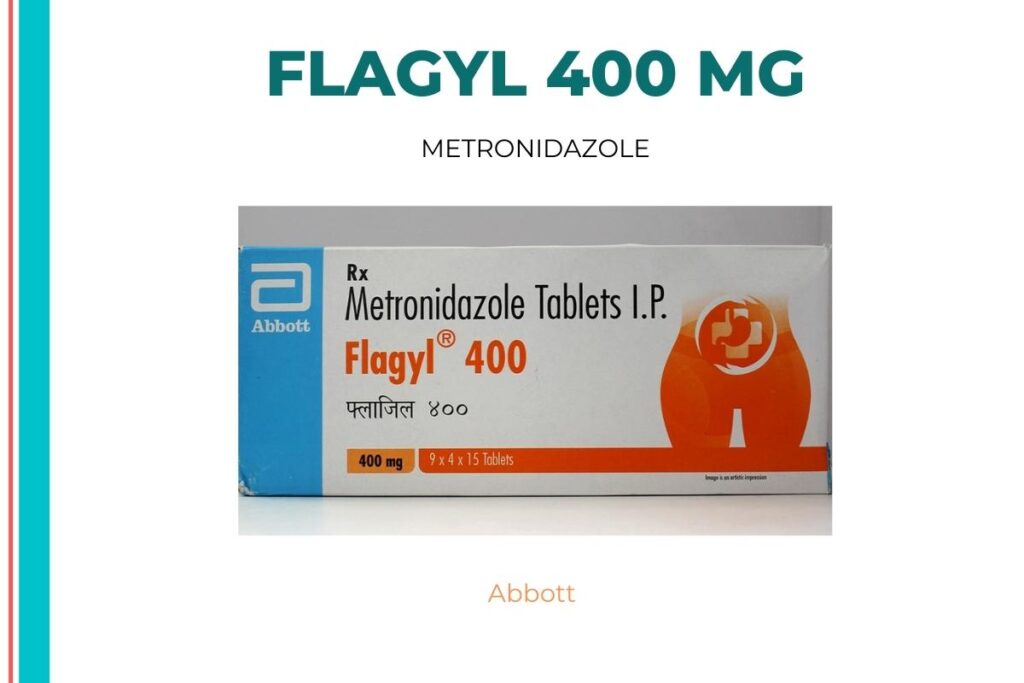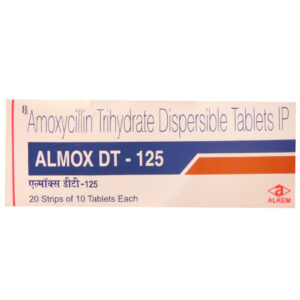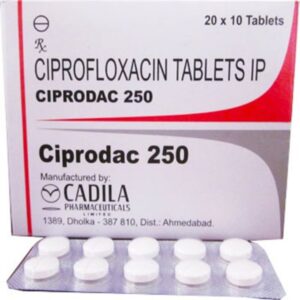Flagyl 400 mg
Flagyl 400 mg belongs to the antibiotic class of drugs that are used to treat illnesses caused by bacteria and parasites (amoeba). It is used to treat diarrhea caused by Clostridium difficile, Entamoeba histolytica, and Giardia lamblia bacteria. It can also be used to treat bacterial infections in the vaginal area.
Flagyl 400 mg inhibits the creation of proteins essential for the survival of dangerous bacteria and parasites (amoeba) and so slows or kills their growth. It acts by destroying germs that cause illnesses and is bactericidal. It stops bacterial cells from dividing and hinders them from mending themselves. It destroys the germs in its entirety. A viral infection such as the flu or a common cold is not treated with Flagyl 400 mg.
Flagyl 400 mg comes in a variety of strengths, as well as vaginal creams/inserts, topical creams, and injections. The dose will be determined by your doctor based on the kind of illness being treated. Flagyl 400 mg is an oral antibiotic that may be taken with or without meals. During your therapy, you should avoid drinking alcoholic drinks since they might produce flushing and an overall sense of being sick. Nausea, vomiting, upset stomach, loss of appetite, dry mouth, and metallic taste are all frequent adverse effects of Flagyl 400 mg. If these side effects persist, contact your doctor or pharmacist.
Flagyl 400 mg should not be taken when pregnant, particularly in the first trimester. So, if you’re pregnant or intending to get pregnant, tell your doctor. While using Flagyl 400 mg, you should not breastfeed since it goes into the breastmilk and might harm the infant. After using Flagyl 400 mg, do not drive or operate heavy machinery since it may induce dizziness, drowsiness, and a loss of alertness.
If you suffer dehydration symptoms such as a dry mouth, excessive thirst, wrinkled skin, little or no urine, dizziness, or lightheadedness, you should see a doctor right once. Long-term use of Flagyl 400 mg has been linked to leukopenia in certain people (low count of white blood cells). Flagyl 400 mg is not recommended for patients with central nervous system (CNS) illnesses such as seizures (fits). If you have dysentery or diarrhea, you should take probiotics, prebiotics, and drink lots of water.

Flagyl 400 mg uses
Infections caused by bacteria Entamoeba histolytica, Giardia lamblia, or Clostridium difficile diarrhea Bacterial infections in the vaginal area, Infections in the mouth, infections after surgery, and infections in the body as a whole Bacterial infections of the skin
Medicinal Advantages
Flagyl 400 mg is a broad-spectrum antibiotic that works against a wide range of bacteria, both gram-positive and gram-negative. Kills the germs and amoeba that cause diarrhea (Entamoeba histolytica, Giardia lamblia, Clostridium difficile). It stops the dangerous germs from producing proteins necessary for their existence. It works by destroying germs that cause illnesses and is bactericidal in nature. It destroys the germs and stops the illness from progressing further. A viral infection such as the flu or a common cold is not treated with Flagyl 400 mg.
Use Instructions
Flagyl 400 mg comes in a variety of strengths, as well as vaginal creams/inserts, topical creams, and injections. The dose will be determined by your doctor based on the kind of illness being treated. Flagyl 400 mg is an oral antibiotic that may be taken with or without meals. During your therapy, you should avoid drinking alcoholic drinks since they might produce flushing and an overall sense of being sick.
Storage
Store in a cool, dry location away from direct sunlight.
Flagyl 400 mg Side Effects
The majority of Flagyl 400 mg side effects do not require medical care and fade away with time. However, if the negative effects do not go away, see your doctor. Nausea, vomiting, upset stomach, lack of appetite, dry mouth, and metallic taste are the most typical adverse effects of Flagyl 400 mg. The above side effects do not have to be experienced by everyone. Consult a doctor if you experience any discomfort.
Drug Recommendations
During pregnancy, especially in the first trimester, metronidazole should be avoided. So, if you’re pregnant or intending to get pregnant, tell your doctor. While using Metronidazole, you should not breastfeed since it goes into the breastmilk and can harm the infant. After using Metronidazole, avoid driving or operating heavy machinery since it may induce dizziness, sleepiness, and a loss of alertness. If you are allergic to Metronidazole or other antibiotics, blood thinners (coumarins, warfarin), anti-epileptic medications (phenobarbital, phenytoin, primidone), or anti-cancer therapies, you should not use Metronidazole (busulfan, fluorouracil, mycophenolate). If you suffer dehydration symptoms such as a dry mouth, excessive thirst, wrinkled skin, little or no urine, dizziness, or lightheadedness, you should see a doctor right once. Long-term Metronidazole use has been linked to leukopenia in rare cases (low count of white blood cells). Metronidazole is not recommended for patients with central nervous system (CNS) problems such as seizures (fits). If you have dysentery or diarrhea, you should take probiotics, prebiotics, and drink lots of water.
Interactions Between Drugs
Metronidazole interacts with blood thinners (coumarins, warfarin), epilepsy medications (phenobarbital, phenytoin, primidone), depression medications (lithium), cancer medications (busulfan, fluorouracil, or mycophenolate), alcohol addiction medications (disulfiram), and stomach ulcer medications (disulfiram) (cimetidine).
Drug-Food Interaction: Alcohol consumption should be avoided since it might cause flushing, sleepiness, and dizziness.
People with liver problems, muscle problems (myasthenia gravis), heart rhythm disorders (arrhythmia), seizures (fits), alcoholism, cancer, electrolyte imbalance (low potassium or magnesium level), colitis (intestinal inflammation), porphyria (rare genetic blood disorder), and neuro-related diseases should not take metronidazole.
Safety Suggestions
ALCOHOL
To avoid unpleasant side effects, you should not drink alcohol while taking Metronidazole.
PREGNANCY
During pregnancy, especially in the first trimester, metronidazole should be avoided.
BREAST FEEDING
Take Metronidazole just as directed; it is known to transfer to the infant in a small amount via breast milk.
DRIVING
Metronidazole might make you dizzy, which can make it difficult to drive.
LIVER
Metronidazole should be used with caution, especially if you have a history of liver problems. Your doctor may need to modify the dosage.
KIDNEY
Metronidazole should be used with caution, especially if you have a history of kidney problems. Your doctor may need to alter your dose.
No habit formation
Advice on Diet and Lifestyle
If you have diarrhea, drink plenty of water to avoid becoming dehydrated.
Caffeine-free soft beverages, juices, or sport rehydration drinks will suffice if you have minimal diarrhea (less than four stools per day).
If the diarrhea is severe, you should consume specially made rehydration liquids.
Recommendations
If you experience adverse reactions such as a rash that is itchy, swelling of the face, lips, tongue, or throat, fever, or difficulty breathing, please contact your doctor right once.
Don’t forget to take your medications. Your infection may return if you stop taking the medicines. Talk to your doctor before stopping and follow their advise.
Other details : This item is non-refundable.
Glossary of Diseases and Conditions
Bacterial infection is a situation in which dangerous bacteria enter our bodies, grow, and infect us. It may target any portion of the body and multiply swiftly. When bacteria infects you, you may have nonspecific symptoms such as fevers, chills, and exhaustion. Bacteria come in a variety of shapes, the most common of which are spherical, rod-shaped, and spiral-shaped. Bacterial infections range from simple ailments such as sore throats and ear infections to serious diseases such as meningitis and encephalitis. Streptococcus, Staphylococcus, and E. coli are some of the bacteria that cause illnesses. A bacterial illness can affect anyone at any time. People with weakened immune systems or those using immunosuppressive medications, on the other hand, are more susceptible to bacterial infection.
Entamoeba histolytica, a parasitic amoeba, causes amoebic dysentery, an intestinal (bowel) infection spread by human excrement (poop). There are usually no symptoms, although it can cause diarrhea (loose stool/poop), nausea (a sense of illness in the stomach), and weight loss in some people.
FAQs
If the yellowing of your skin persists and does not go away, please see your doctor very once.
You must finish the whole course of Metronidazole as directed by your doctor. Metronidazole will function when you’ve finished the entire course. Metronidazole must be taken at the correct dose, at the correct times, and for the correct number of days.
Metronidazole is an antibiotic medication that only works on bacterial illnesses, not viral infections such as the common cold and flu. Metronidazole should not be taken without first visiting your doctor. Self-medication is risky and can reduce Metronidazole’s potency, resulting in antibiotic resistance.
If you forget to take a Metronidazole dosage, take it as soon as you recall. If the next dose is approaching, do not take a double dose to make up for a missed one.








Leave a Reply
You must be logged in to post a comment.